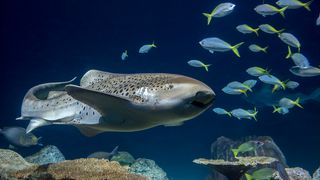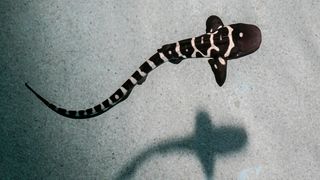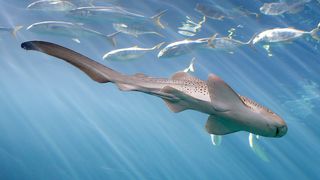Female zebra shark opts for 'virgin birth' even when sharing a tank with healthy males
A female zebra shark conceived her pups through 'virgin birth,' despite sharing a tank with two males.

A female zebra shark (Stegostoma fasciatum) has given birth by fertilizing her own eggs, despite sharing a tank with two healthy males who likely would have been eager to help, reports a new study in the Journal of Fish Biology. This unusual scenario challenges prior assumptions about the risks and benefits of parthenogenesis — a form of asexual reproduction sometimes nicknamed "virgin birth" — according to the study's authors.
"This is only the second case that we know of where sharks have been born by parthenogenesis even when there were healthy mates available," study author Kevin Feldheim of the Field Museum of Natural History in Chicago, said in a statement. "This latest paper is just another step in learning why these 'virgin births' happen."
A number of bird, reptile, amphibian and fish species use parthenogenesis as a biological back-up plan for reproducing when mates are hard to come by. But the process can be risky; animals born via parthenogenesis generally have shorter lifespans and are often sterile, which may explain why vertebrate species capable of asexual reproduction seldom choose to utilize it unless they're out of options.
Related: Hail Mary! 9 amazing tales of virgin births in the animal kingdom

Feldheim and colleagues discovered an odd exception to the usual rules of parthenogenesis while performing routine genetic testing on two shark pups at Chicago's Shedd Aquarium.
The DNA results were astounding. The pups matched none of the male sharks in the tank. And while their DNA matched the female shark, some of those matches were too close for comfort. Several gene pairs that should have reflected a father's contribution were, instead, identical copies of the mother's genes — a finding highly suggestive of parthenogenesis.
Beyond genetics, there were other suspicious signs. Although pups normally hatch on their own, aquarium staff had to cut open the pups' egg cases; both pups ultimately survived only a matter of months.
Sign up for the Live Science daily newsletter now
Get the world’s most fascinating discoveries delivered straight to your inbox.
The pups may have died due to harmful recessive alleles — nonfunctional or defective copies of the mother shark's genes that, in babies produced via sexual reproduction, would have been compensated for by a dominant gene with normal function from the other parent. Instead, these baby sharks may have inherited multiple copies of the defective gene variants from the mother.

One of the downsides of asexual reproduction is that both copies of a gene come from the same parent, leaving no room for error; if the mother is a carrier for an autosomal recessive disorder, meaning it takes two copies of the gene to manifest disease, the offspring will have it. While the authors of the study could not confirm that deleterious recessive alleles were to blame for the demise of these particular pups, such would be typical of parthenogenesis, they said.
The findings may have implications for zebra shark conservation. Because these sharks are an endangered species, learning more about how they reproduce could help aquariums breed them in captivity. In fact, the only other reported case of female zebra sharks choosing parthenogenesis over an eligible male was part of a larger investigation exploring the use of reproductive technologies to bolster conservation-based breeding programs.
"This study is just the beginning of our understanding of the occurrence of this genetic phenomenon in zebra sharks," said study author Lise Watson, assistant director of animal operations and habitats at Shedd Aquarium, in the release. "Zoos and aquariums like Shedd have a key role to play in the conservation of species like zebra sharks, which are nearly extinct in some parts of the world. Knowing more about parthenogenesis and confirming the genetic makeup of our populations in zoos and aquaria is crucial to making informed decisions that fuel this work."

Joshua A. Krisch is a freelance science writer. He is particularly interested in biology and biomedical sciences, but he has covered technology, environmental issues, space, mathematics, and health policy, and he is interested in anything that could plausibly be defined as science. Joshua studied biology at Yeshiva University, and later completed graduate work in health sciences at Cornell University and science journalism at New York University.
